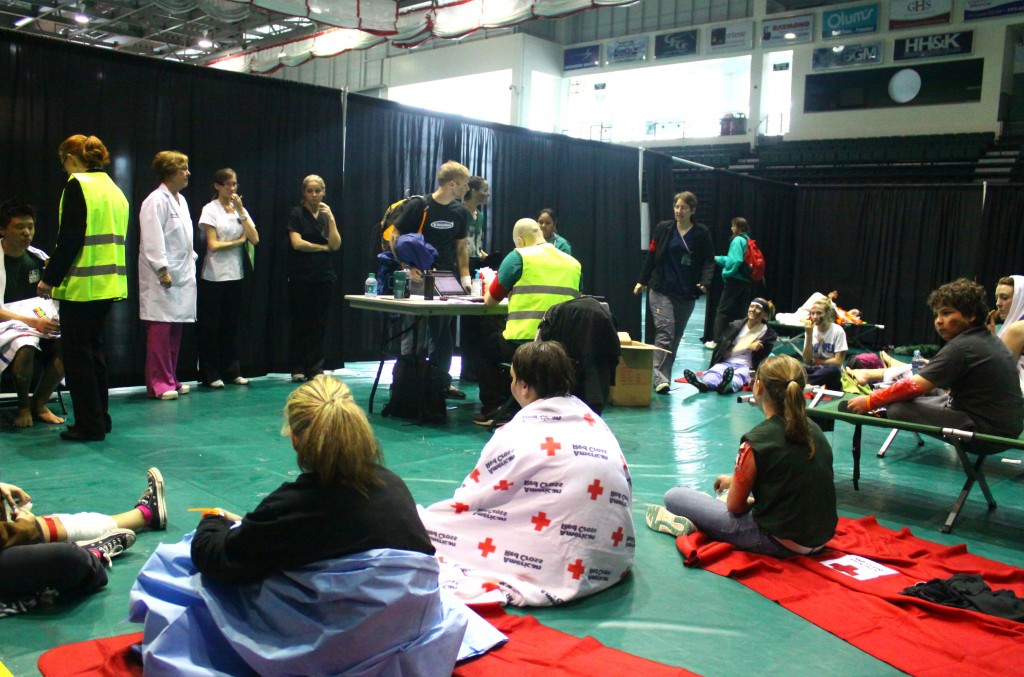
An annual disaster drill gained added significance this year for students in the Decker School of Nursing.
After Decker students were called to aid victims in an actual disaster caused by devastating local floods last September, the experience of planning a drill to train workers for real-life situations became more meaningful, according to senior Danielle Ponticiello.
Margaret Decker, a clinical lecturer in Decker and a 14-year veteran of the drill, said that the September flooding showed just how necessary the drills are.
“We had areas that needed improvement,” Decker said.
This year’s mock scenario was an earthquake striking Schoharie County, causing local hospitals to fill up. Some senior nursing students and community members played the role of patients, while other nursing students treated them. A boy scout troop also assisted in the drill, playing victims to earn a badge for emergency preparedness.
Each patient was assigned a scenario, with a specific ailment, given to them by Decker faculty members. A number of the patients were transported in emergency vehicles to the the mock surge facility.
The drill took place Tuesday morning in the Events Center. Nearly 175 senior nursing students, 20 graduate students working as evaluators, and about 10 junior nursing students participated in the disaster drill. Events Center staff members set up the shelter after reviewing a floor plan with Decker staff and students on Monday.
Graduate students used quality indicators from the federal government’s Agency for Health Care and Research Quality to evaluate participation in the drill. Students also received feedback from the Broome County Community Emergency Response Team (CERT), UHS and Dr. Christopher Ryan, medical director for the Broome County Health Department.
In addition to CERT and UHS, the students collaborated with American Red Cross, Vestal EMS, Harpur’s Ferry, Binghamton’s New York State University Police, Susquehanna Nursing Care and Rehabilitation Center and the Broome County Health Department.
Ponticiello said the drill is a “great teaching tool” for nursing students.
“It is an important experience for us to be a part of,” Ponticiello said. “You learn how to work in a high stress situation that isn’t exactly textbook but for many of us could be a reality.”
The nursing students began to plan and organize the annual drill in January. All of the Decker seniors helped with the planning. Jennifer Houseknecht and Ponticiello were designated by the Decker professors as the two student incident command leaders.
Some mock patients were assigned scenarios that required them to be decontaminated. A group of students participating in the drill volunteered to learn how to do HAZMAT decontamination to practice treating them.
Students helped patients in the drill order prescription drugs from doctors and communicating with doctors to determine which of each patient’s regular medications needed to be ordered immediately and which medications could wait.
Decker said that the Events Center shelter during the flood had issues with tracking patients. Because of this, she told nursing students that they needed to organize a new system for tracking patients, and suggested a switch from using clipboards to a computer database system to record information about patients.
“I said to them, ‘This year you’ve got to really focus on tracking patients,’” Decker said.
Students decided to use laptops during the drill and shared information using Google Docs.
Binghamton’s department of social work helped with the drill to tend to the mock psychological needs of patients, according to assistant clinical professor Laura Kasey.
“A lot of the medical and psychological issues that occur during a disaster need to be addressed,” Kasey said.
Kasey also teaches disaster preparedness classes on campus and has been a part of the drill for about 12 years. She has been writing scenarios for the drills since 2005 and penned this year’s earthquake scenario.
Kasey was a part of the disaster relief effort in the Events Center during the flood that hit Binghamton last fall. She said that practicing during drills will help workers to be ready for real disasters.
“It’s hard to do the real thing if you haven’t practiced together,” she said.
Decker said that the drill takes place each May and students apply the clinical nursing skills they have learned throughout the year to running the drill.
“It’s a culmination of the preparation all year,” Decker said.


